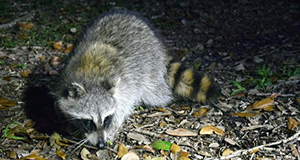Abstract
Diseases carried by northern raccoons present significant health hazards to both people and pets. This 7-page fact sheet written by Caitlin Jarvis, Samantha M. Wisely, and Mathieu Basille and published by the UF/IFAS Department of Wildlife Ecology and Conservation is part of a series addressing health hazards associated with raccoons. It describes rabies, canine distemper, feline distemper, canine parvovirus, salmonellosis, and several other raccoon-borne viral and bacterial diseases of concern to people and their pets. Sick wild animals can act tame, but do not approach! Contact animal control or a wildlife rehabilitator if an animal seems to be behaving abnormally or if you suspect it is sick.
https://edis.ifas.ufl.edu/uw478">https://edis.ifas.ufl.edu/uw478
Unless otherwise specified, articles published in the EDIS journal after January 1, 2024 are licensed under a Creative Commons Attribution-NonCommercial-NoDerivs 4.0 International (CC BY-NC-ND 4.0) license.

